theartsdesk in Bergen 1: Jazz in a sardine factory | reviews, news & interviews
theartsdesk in Bergen 1: Jazz in a sardine factory
theartsdesk in Bergen 1: Jazz in a sardine factory
Cacophony, minimalism and the confessional at the Nattjazz Festival on Norway’s west coast
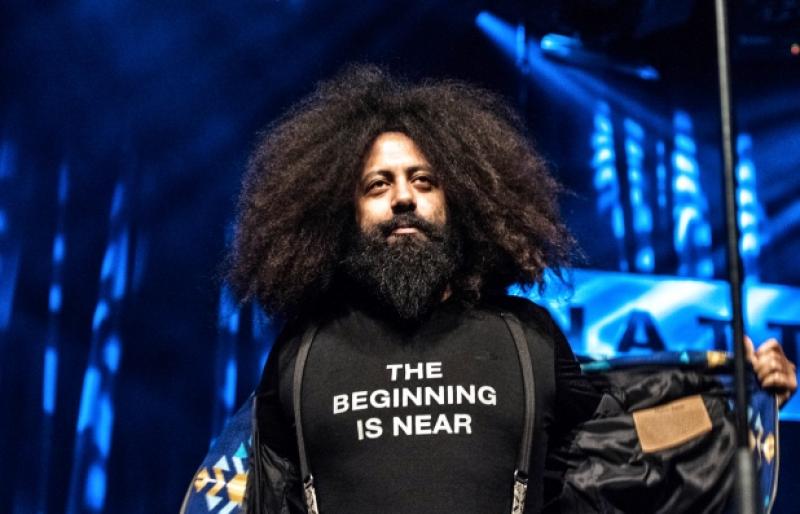
Reggie Watts has a few things to say about Norway. In Bergen to play Natjazz, the annual jazz festival, he’s concerned about the local predilection for fish soup. Be careful, he warns, it can be dangerously hot. Then there are trolls and the Norwegian crispbread knekkebrød, which is especially impressive as it can keep fillings dry. Sandwiches can be eaten in the rain – and it rains in Bergen. A lot. Watts is fascinated by the countryside cabins Norwegians take off to in the summer.
Naturally, all this ribbing goes down a storm. Everyone loves having their quirks pointed out – the things making them special. The connection Watts makes with the audience is especially potent as he had played Nattjazz in 2013 and was the hit of the festival. This year’s return visit strengthens the unlikely bond between locals – the Bergensers – and the American human beat-box, live-looping comedian, singer and storyteller. He’s this year’s festival poster boy.
When Watts isn’t making gentle fun of where he is, he sings, hilariously undermines the tropes of modern-day R&B and rap, and tells surreal stories. Sitting at a keyboard, his voice is revealed to have a sweet emotion reminiscent of Al Green’s. This quick-witted one-man revue is a winner, but tagging him as jazz is a stretch. Amongst Nattjazz’s – translated as “night jazz” – characteristic is a tendency to play with boundaries. The festival also breaks its own physical borders. Concerts are also held in nearby towns, coastal Bergen’s hotels and the 19th-century island home of composer-violinist Ole Bull.
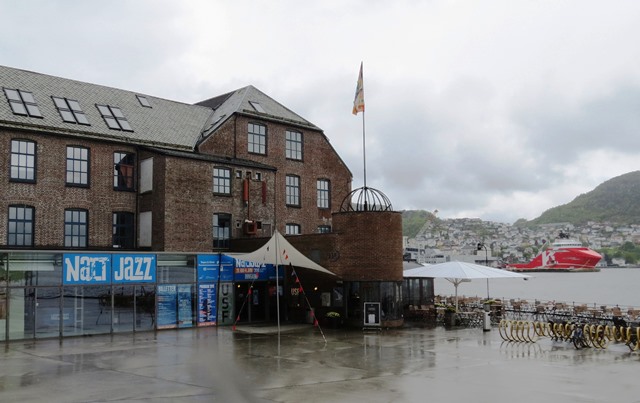 Nattjazz, also more formally known as the Bergen International Jazz Festival, was first held in 1972. Its current base is the USF-Verftet (pictured right), a former fish processing plant run by United Sardine Factories (the USF) on the waterfront of Puddefjordan, one of the two waterways around which the double-horseshoe Bergen is wrapped. Within the complex are bars, a restaurant and three venues.
Nattjazz, also more formally known as the Bergen International Jazz Festival, was first held in 1972. Its current base is the USF-Verftet (pictured right), a former fish processing plant run by United Sardine Factories (the USF) on the waterfront of Puddefjordan, one of the two waterways around which the double-horseshoe Bergen is wrapped. Within the complex are bars, a restaurant and three venues.
As well as rain, the town – Bergseners do not call it a city – is awash with cultural happenings and history. A short walk north across a finger of land reaches Vågen, Bergen’s better-known inlet: along its north side are the timber buildings of Bryggen, the former Hanseatic trading district and UNESCO World Heritage Site. Nattjazz takes place concurrent with Festspillene i Bergen (the Bergen International Festival). If that weren’t enough, Bergen is a beguiling, picturesque place loomed over by the seven mountains cradling its landward aspect.
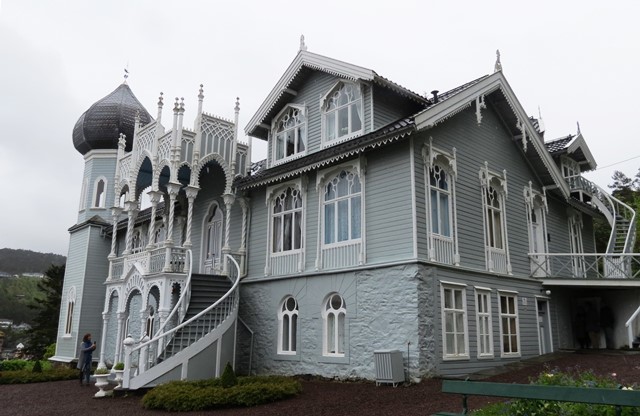 The spirit of Bergen-born Ole Bull is as inescapable as the threat of a downpour and the mountain backdrop. Like Edvard Grieg, Bull was and remains ever-present in his home town. Where Grieg gets a town-centre statue and a concert hall named after him, Bull has the statue but also a street, bars, restaurants and hotels branded in his honour. It’s fitting. Bull was not shy. In the 1850s, he started a settlement in America called New Norway.
The spirit of Bergen-born Ole Bull is as inescapable as the threat of a downpour and the mountain backdrop. Like Edvard Grieg, Bull was and remains ever-present in his home town. Where Grieg gets a town-centre statue and a concert hall named after him, Bull has the statue but also a street, bars, restaurants and hotels branded in his honour. It’s fitting. Bull was not shy. In the 1850s, he started a settlement in America called New Norway.
Material evidence for the larger-than-life, world-conquering Bull comes in the form of his house on the island of Lysøen, a 50-minute ferry ride from Bergen. He decided his house should reflect all the places he had been. It’s a nutty amalgam (pictured above left). Features include a Russian-style onion dome, Moorish portico and an Alpine chalet layout. The inside sports Bohemian glass chandeliers, Star of David carvings and a massive hybrid American-Norwegian flag he had been presented. This setting hosted a performance by the minimalist pianist Christian Wallumrød. At Lysøen, he drew from his recent and first solo album Pianokammer, playing pieces so fluid and so spectral they were almost not there – one arpeggio flowed into the next like melting water from a glacier dispersing into the ground. Spellbinding.
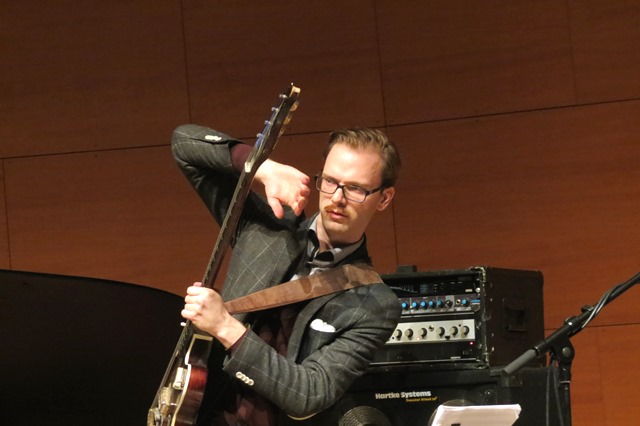 East of Bergen and inland, the Kabuso arts centre in the beautiful town of Øystese, along the north bank of the Hardanger fjord, was the setting for the trio Orter Eparg. Their interpretations of elegant compositions by their bassist Dan Peter Sundland (pictured right) conjured an unlikely vision of Vince Guaraldi cosying up to Thelonious Monk. Fusing the melodic and the dissonant simultaneously is tough to pull off, but Orter Eparg did exactly that.
East of Bergen and inland, the Kabuso arts centre in the beautiful town of Øystese, along the north bank of the Hardanger fjord, was the setting for the trio Orter Eparg. Their interpretations of elegant compositions by their bassist Dan Peter Sundland (pictured right) conjured an unlikely vision of Vince Guaraldi cosying up to Thelonious Monk. Fusing the melodic and the dissonant simultaneously is tough to pull off, but Orter Eparg did exactly that.
Heading more directly towards the heart of cacophony were the outstanding and powerful trio Gard Nilssen`s Acoustic Unity, playing a hotel restaurant in downtown Bergen. Nilssen, familiar in pop as Susanne Sundfør’s drummer and in improv as half of sPacemoNkey, had teamed up with sax playing Motorpsycho collaborator André Roligheten and bassist Petter Eldh. As the handle Acoustic Unity implies, there is a fusion aspect to the trio. But this is not a music rooted in the Sixties or Seventies. The continual and rolling crescendos were akin to hardcore punk. Of the off-festival shows, this was the highlight.
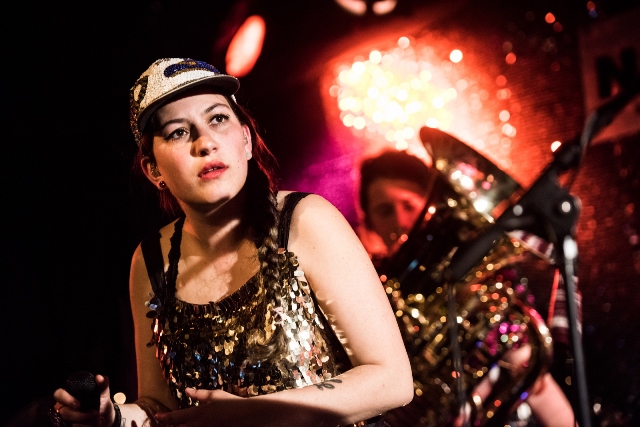 Back at the sardine factory and Nattjazz proper in the night club-like room Sardinen, the standouts were the band Broen (pictured left, photo © Øyvind Toft/Nattjazz), whose sharp-edges touched on trip-hop and Neneh Cherry at her jazziest, and the wonky trio Agbaland which featured Sigbjørn Apeland at deconstructed, almost falling apart keyboards and Terje Isungset, who eschewed his ice instruments in favour of more standard percussion. With Per Jørgensen on trumpet and scattershot vocal interjections the trio created a tonal analogue of ships rubbing a harbour wall.
Back at the sardine factory and Nattjazz proper in the night club-like room Sardinen, the standouts were the band Broen (pictured left, photo © Øyvind Toft/Nattjazz), whose sharp-edges touched on trip-hop and Neneh Cherry at her jazziest, and the wonky trio Agbaland which featured Sigbjørn Apeland at deconstructed, almost falling apart keyboards and Terje Isungset, who eschewed his ice instruments in favour of more standard percussion. With Per Jørgensen on trumpet and scattershot vocal interjections the trio created a tonal analogue of ships rubbing a harbour wall.
While the Argentinian vocal tango star Melingo was as big a draw as Reggie Watts, the USF’s main hall was also crammed for Norwegian best-seller Emilie Nicolas whose moody electropop is given an added edge by cut-glass vocals. As with Watts, it’s difficult to make a case for her as jazz. Although not immediate, Nicolas's songs score on atmosphere rather than melody. In the last year, she’s become a mainstream chart regular in Norway and it’s not hard to see her appealing more widely.
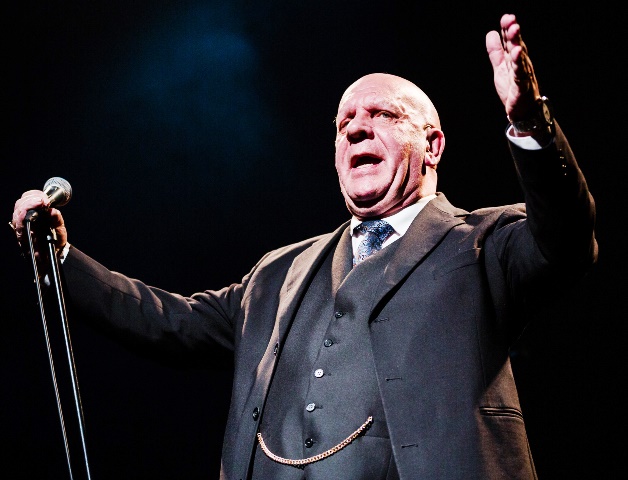 Nattjazz opened with a profoundly local flavour though: one where it was impossible to see how it could draw a non-Norwegian audience. Billed as Obra, the performance was a collaboration between the Bergen Big Band and the theatrical group Batagraf. After beginning with some disjointed swing, proceedings were soon interrupted by an arm-waving gent stuffed into a suit who turned out to be Councillor Boyum (pictured right, photo © Oddbjørn Steffensen/Nattjazz), the big boy of the eponymous fictional small-town local authority somewhere on the other side of the mountain who protects his monopoly in seafood. Soon, his wife and mistress became part of the story along with a clipboard-wielding jobsworth badgering the musicians with questions about what they were doing.
Nattjazz opened with a profoundly local flavour though: one where it was impossible to see how it could draw a non-Norwegian audience. Billed as Obra, the performance was a collaboration between the Bergen Big Band and the theatrical group Batagraf. After beginning with some disjointed swing, proceedings were soon interrupted by an arm-waving gent stuffed into a suit who turned out to be Councillor Boyum (pictured right, photo © Oddbjørn Steffensen/Nattjazz), the big boy of the eponymous fictional small-town local authority somewhere on the other side of the mountain who protects his monopoly in seafood. Soon, his wife and mistress became part of the story along with a clipboard-wielding jobsworth badgering the musicians with questions about what they were doing.
Boyum’s corruption extended to siphoning money from foreign investors for his dodgy deals. Has wife's brother has comittted suicide. She is forced to socialise with Boyum's mistress, his personal assistant. This surreal spectacle was like peaking though a window and uncomfortably encountering a section of Norwegian society conducting some self-examination that would have been best kept private.
For Reggie Watts, Norway was entertainingly and pithily encapsulated by traits to which everyone could happily relate. His self-depreciating audience adored the chance to laugh at themselves. With the spikier Obra, a lid was lifted on a small aspect of Norway which no doubt can be found almost anywhere, but is usually hidden. The audience were absorbed, but lifting such a lid was confessional. This year, Nattjazz wasn’t only about the names on the bill.
Share this article
The future of Arts Journalism
You can stop theartsdesk.com closing!
We urgently need financing to survive. Our fundraising drive has thus far raised £49,000 but we need to reach £100,000 or we will be forced to close. Please contribute here: https://gofund.me/c3f6033d
And if you can forward this information to anyone who might assist, we’d be grateful.

Subscribe to theartsdesk.com
Thank you for continuing to read our work on theartsdesk.com. For unlimited access to every article in its entirety, including our archive of more than 15,000 pieces, we're asking for £5 per month or £40 per year. We feel it's a very good deal, and hope you do too.
To take a subscription now simply click here.
And if you're looking for that extra gift for a friend or family member, why not treat them to a theartsdesk.com gift subscription?
more New music
 Mariah Carey is still 'Here for It All' after an eight-year break
Schmaltz aplenty but also stunning musicianship from the enduring diva
Mariah Carey is still 'Here for It All' after an eight-year break
Schmaltz aplenty but also stunning musicianship from the enduring diva
 Album: Solar Eyes - Live Freaky! Die Freaky!
Psychedelic indie dance music with a twinkle in its eye
Album: Solar Eyes - Live Freaky! Die Freaky!
Psychedelic indie dance music with a twinkle in its eye
 Album: Night Tapes - portals//polarities
Estonian-voiced, London-based electro-popsters' debut album marks them as one to watch for
Album: Night Tapes - portals//polarities
Estonian-voiced, London-based electro-popsters' debut album marks them as one to watch for
 Album: Mulatu Astatke - Mulatu Plays Mulatu
An album full of life, coinciding with a 'farewell tour'
Album: Mulatu Astatke - Mulatu Plays Mulatu
An album full of life, coinciding with a 'farewell tour'
 Music Reissues Weekly: Sly and the Family Stone - The First Family: Live At Winchester Cathedral 1967
Must-have, first-ever release of the earliest document of the legendary soul outfit
Music Reissues Weekly: Sly and the Family Stone - The First Family: Live At Winchester Cathedral 1967
Must-have, first-ever release of the earliest document of the legendary soul outfit
 Album: Robert Plant - Saving Grace
Mellow delight from former Zep lead
Album: Robert Plant - Saving Grace
Mellow delight from former Zep lead
 Brìghde Chaimbeul, Round Chapel review - enchantment in East London
Inscrutable purveyor of experimental Celtic music summons creepiness and intensity
Brìghde Chaimbeul, Round Chapel review - enchantment in East London
Inscrutable purveyor of experimental Celtic music summons creepiness and intensity
 First Person: Musician ALA.NI on how thoughts of empire and reparation influenced a song
She usually sings about affairs of the heart - 'TIEF' is different, explains the star
First Person: Musician ALA.NI on how thoughts of empire and reparation influenced a song
She usually sings about affairs of the heart - 'TIEF' is different, explains the star
 Album: NewDad - Altar
The hard-gigging trio yearns for old Ireland – and blasts music biz exploitation
Album: NewDad - Altar
The hard-gigging trio yearns for old Ireland – and blasts music biz exploitation
 Album: The Divine Comedy - Rainy Sunday Afternoon
Neil Hannon takes stock, and the result will certainly keep his existing crowd happy
Album: The Divine Comedy - Rainy Sunday Afternoon
Neil Hannon takes stock, and the result will certainly keep his existing crowd happy
 Music Reissues Weekly: Robyn - Robyn 20th-Anniversary Edition
Landmark Swedish pop album hits shops one more time
Music Reissues Weekly: Robyn - Robyn 20th-Anniversary Edition
Landmark Swedish pop album hits shops one more time
 Album: Twenty One Pilots - Breach
Ohio mainstream superstar duo wrap up their 10 year narrative
Album: Twenty One Pilots - Breach
Ohio mainstream superstar duo wrap up their 10 year narrative

Add comment